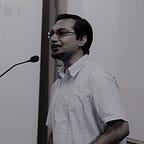What is Knowledge? And what heated debates forget — Part 1
Prelude
Have you ever been through an experience when someone you were comfortable with a while ago, suddenly makes your skin crawl, leaving you with bad taste after a heated debate?
Emotional fatigue in the aftermath of debating on a polarised topic of conversation with people close to us leaves us with a deeper gash. In comparison debating in an organised circuit has insignificant effect on us
This is the 21st century and pretty much every person connected to the internet has at one point, or multiple occurrences found themselves in a conversation that ends up on bickering and perhaps concludes a relationship. A simple light hearted conversation escalates into an argument, eventually becoming emotionally charged, to the point the entire scenario becomes a fiasco of ideological defence.
From what begins as a simple conversation, undergoes a metamorphosis; ears are shut, listening and understanding get tossed out the window, and dialogue becomes a polarised debate. Such arguments spiral into a contest of counter arguments — insults, with humiliating intent. A duel of right vs wrong, fact vs belief, red vs green, and winner vs loser. No one likes to have a Non-Zero Sum game, a game of trust.
Fingers point in both direction, neither side willing to back down. When the dust finally settles, the carnage appears similar to the end of World War One. Bitter tastes, hurt egos, fractured relationships and nothing on the mind short of preparation for the next World War.
Wouldn't you ever wonder the cause or behaviour that engulfs people in a frenzy, emerging out of a conversation — metamorphosing into a Word War.
The similarity is uncanny, and yet there were such heated debates in Europe; lost in time, and hard to trace any single source of origin that has led to endless conflict in the European theatre and gradually enveloping the rest of the world in it.
And so intelligent people who value relationships would ask. For problems are understood through questions.
It all Began with Questions
The prelude finger pointed towards Europe. What’s Europe got to do with all this? Now before you rally an angry mob with flames and pitch forks, or better yet in modern times, with guns and bombs, reading the entire article will give valuable insight to the title.
Europe was the first geographic region in recorded human history of the last 5,000–7,000 years where questioning absolutism was developed. The defining era came to be known as the period of Renaissance. So followed it centuries of discovery, invention and innovation at an ever increasing scale unprecedented in the history of Earth for any creature.
The outcome from the period of Renaissance was questioning absolute beliefs. Humans have known to exist for more than 100,000 years. Some anthropologists date our ancestral existence in primitive form even farther, up to 850,000 years. Surely aeons ago when fathoming the length of time humans have existed. Among first inventions by humans, the Fire and Wheel date back 10,000 years ago. Another notable invention was the idea of religion.
Now if someone wants to know more about religion, they can look up Wikipedia for their own pursuit. For the purpose of this article, the description surrounding religion settles at its eventual adoption in human culture. Wherever humans migrated and settled, so did their religion. As human territories expanded, so did religions. Religion also underwent variety, diversity, expansion. By now, known religions number in the thousands. Fascinatingly, following closely behind religion has been another idea, a rather juxtaposed one — conflict.
What has conflict got to do with religion? The answer is very relevant to this subject of knowledge. For religions, whatever preached beliefs they propagate have two common elements, among several others. Verily,
- worship of the prescribed ideas enveloped in a religion, and
- those ideas being absolutely unquestionable.
Transgression by adherents of a religion of these two elements, often finds the result as excommunication (outcast) or subject to punishment, social, psychological and sometimes physically violent.
This policy of transgression includes questioning the very ideas defining a religion, and this punishment is similarly exercised upon outsiders unaffiliated and not subscribing to certain beliefs.
Before the Renaissance and even a few hundred years after the era, conflict based on differences in religious ideas has been a significant factor of warfare for much of human history. And this hasn’t entirely ceased in function even today. However, conflict based on religious differences has ceased to exist in Europe. At least for now.
The absolute likes to wield authority; questioning authority leads to conflict. And so the duel pits dogmatism versus pragmatism.
